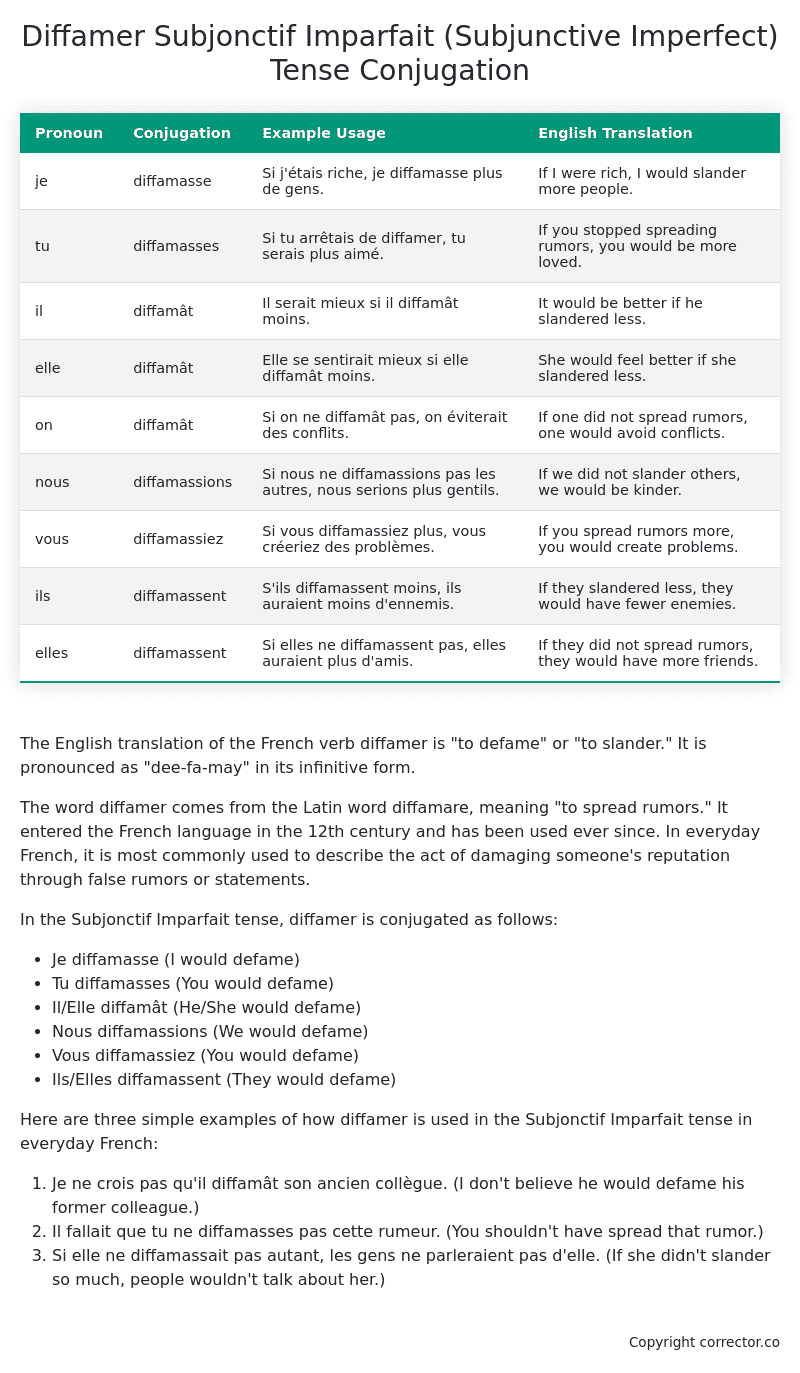Subjonctif Imparfait (Subjunctive Imperfect) Tense Conjugation of the French Verb diffamer
Introduction to the verb diffamer
The English translation of the French verb diffamer is “to defame” or “to slander.” It is pronounced as “dee-fa-may” in its infinitive form.
The word diffamer comes from the Latin word diffamare, meaning “to spread rumors.” It entered the French language in the 12th century and has been used ever since. In everyday French, it is most commonly used to describe the act of damaging someone’s reputation through false rumors or statements.
In the Subjonctif Imparfait tense, diffamer is conjugated as follows:
- Je diffamasse (I would defame)
- Tu diffamasses (You would defame)
- Il/Elle diffamât (He/She would defame)
- Nous diffamassions (We would defame)
- Vous diffamassiez (You would defame)
- Ils/Elles diffamassent (They would defame)
Here are three simple examples of how diffamer is used in the Subjonctif Imparfait tense in everyday French:
- Je ne crois pas qu’il diffamât son ancien collègue. (I don’t believe he would defame his former colleague.)
- Il fallait que tu ne diffamasses pas cette rumeur. (You shouldn’t have spread that rumor.)
- Si elle ne diffamassait pas autant, les gens ne parleraient pas d’elle. (If she didn’t slander so much, people wouldn’t talk about her.)
Table of the Subjonctif Imparfait (Subjunctive Imperfect) Tense Conjugation of diffamer
| Pronoun | Conjugation | Example Usage | English Translation |
|---|---|---|---|
| je | diffamasse | Si j’étais riche, je diffamasse plus de gens. | If I were rich, I would slander more people. |
| tu | diffamasses | Si tu arrêtais de diffamer, tu serais plus aimé. | If you stopped spreading rumors, you would be more loved. |
| il | diffamât | Il serait mieux si il diffamât moins. | It would be better if he slandered less. |
| elle | diffamât | Elle se sentirait mieux si elle diffamât moins. | She would feel better if she slandered less. |
| on | diffamât | Si on ne diffamât pas, on éviterait des conflits. | If one did not spread rumors, one would avoid conflicts. |
| nous | diffamassions | Si nous ne diffamassions pas les autres, nous serions plus gentils. | If we did not slander others, we would be kinder. |
| vous | diffamassiez | Si vous diffamassiez plus, vous créeriez des problèmes. | If you spread rumors more, you would create problems. |
| ils | diffamassent | S’ils diffamassent moins, ils auraient moins d’ennemis. | If they slandered less, they would have fewer enemies. |
| elles | diffamassent | Si elles ne diffamassent pas, elles auraient plus d’amis. | If they did not spread rumors, they would have more friends. |
Other Conjugations for Diffamer.
Le Present (Present Tense) Conjugation of the French Verb diffamer
Imparfait (Imperfect) Tense Conjugation of the French Verb diffamer
Passé Simple (Simple Past) Tense Conjugation of the French Verb diffamer
Passé Composé (Present Perfect) Tense Conjugation of the French Verb diffamer
Futur Simple (Simple Future) Tense Conjugation of the French Verb diffamer
Futur Proche (Near Future) Tense Conjugation of the French Verb diffamer
Plus-que-parfait (Pluperfect) Tense Conjugation of the French Verb diffamer
Passé Antérieur (Past Anterior) Tense Conjugation of the French Verb diffamer
Futur Antérieur (Future Anterior) Tense Conjugation of the French Verb diffamer
Subjonctif Présent (Subjunctive Present) Tense Conjugation of the French Verb diffamer
Subjonctif Passé (Subjunctive Past) Tense Conjugation of the French Verb diffamer
Subjonctif Imparfait (Subjunctive Imperfect) Tense Conjugation of the French Verb diffamer (this article)
Subjonctif Plus-que-parfait (Subjunctive Pluperfect) Tense Conjugation of the French Verb diffamer
Conditionnel Présent (Conditional Present) Tense Conjugation of the French Verb diffamer
Conditionnel Passé (Conditional Past) Tense Conjugation of the French Verb diffamer
L’impératif Présent (Imperative Present) Tense Conjugation of the French Verb diffamer
L’infinitif Présent (Infinitive Present) Tense Conjugation of the French Verb diffamer
Struggling with French verbs or the language in general? Why not use our free French Grammar Checker – no registration required!
Get a FREE Download Study Sheet of this Conjugation 🔥
Simply right click the image below, click “save image” and get your free reference for the diffamer Subjonctif Imparfait tense conjugation!

Diffamer – About the French Subjonctif Imparfait (Subjunctive Imperfect) Tense
Formation
Common Everyday Usage Patterns
Interactions with Other Tenses
Subjonctif Présent
Indicatif Passé Composé
Conditional
Conditional Perfect
Summary
I hope you enjoyed this article on the verb diffamer. Still in a learning mood? Check out another TOTALLY random French verb conjugation!


